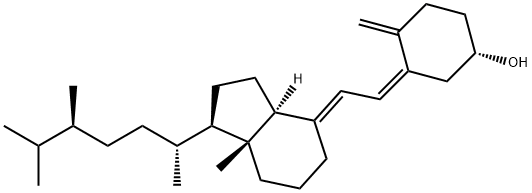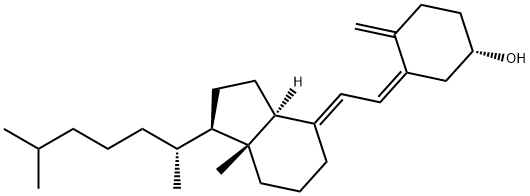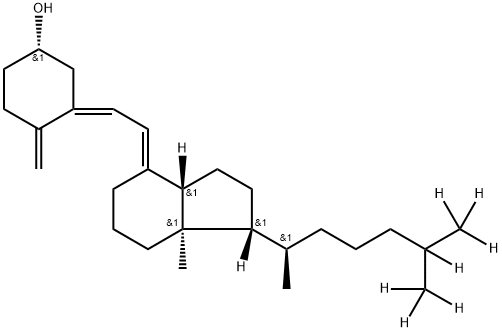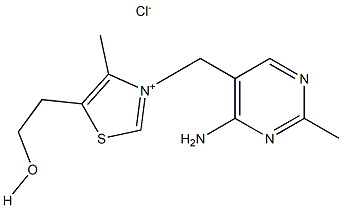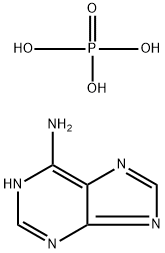22,23-Dihydroergocalciferol , ≥97.0%(HPLC) , 511-28-4
Synonym(s):
Cholecalciferol;Calciol;Vitamin D4;(+)-Vitamin D3;(3β,5Z,7E)-9,10-Secoergosta-5,7,10(19)-trien-3-ol
CAS NO.:511-28-4
Empirical Formula: C28H46O
Molecular Weight: 398.66
MDL number: MFCD00078131
EINECS: 208-127-5
| Pack Size | Price | Stock | Quantity |
| 1MG | RMB1046.40 | In Stock |
|
| 5mg | RMB4415.20 | In Stock |
|
| others | Enquire |
PRODUCT Properties
| Melting point: | 83-86 °C(lit.) |
| alpha | D18 +89.3° (c = 0.47 in acetone) |
| Boiling point: | 504.9±29.0 °C(Predicted) |
| Density | 0.96 |
| storage temp. | 2-8°C |
| solubility | Soluble in Chloroform |
| form | Powder |
| pka | 14.74±0.20(Predicted) |
| color | Off-white to light yellow |
| Stability: | Hygroscopic, Temperature Sensitive |
| CAS DataBase Reference | 511-28-4(CAS DataBase Reference) |
Description and Uses
Derived from cholesterol, vitamin D is biosynthesized from its prohormone cholecalciferol (D3), the product of solar ultraviolet irradiation of 7-dehydrocholesterol in the skin. In 1966, it was first recognized that vitamin D must undergo activation via two oxidative metabolic steps. The first oxidation to 25-hydroxycholecalciferol (25(OH)D3: calcifediol; Calderol) occurs in the endoplasmic reticulum of the liver and is catalyzed by vitamin D 25-hydroxylase. This activation step is not regulated by plasma calcium concentrations. The major circulating form (10–80 μg/mL) is 25(OH)D3, which also is the primary storage form of vitamin D.
Vitamin D4 is the active analogue of Vitamin D.
Safety
| Symbol(GHS) |   GHS06,GHS08 |
| Signal word | Danger |
| Hazard statements | H301+H311-H330-H372 |
| Precautionary statements | P280-P301+P310+P330-P302+P352+P312-P304+P340+P310-P314 |
| Hazard Codes | T+ |
| Risk Statements | 24/25-26-48/25 |
| Safety Statements | 28-36/37 |
| RIDADR | UN 2811 6.1/PG 2 |
| WGK Germany | 2 |
| RTECS | VS2900000 |
| F | 8-10-23 |

